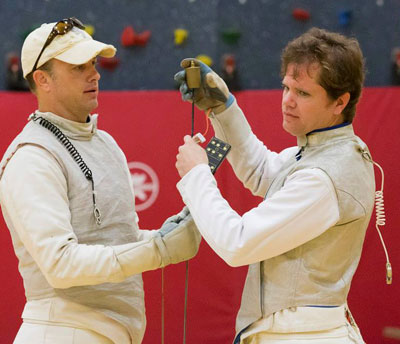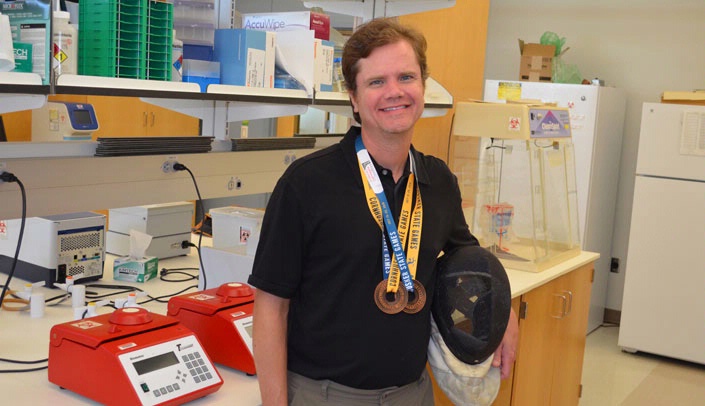James Askew started his fencing studies about the same time he started his scientific studies — freshman year of college at the University of Nebraska at Omaha.
Today, he’s a standout in both disciplines.
Omaha Fencing Club
The Omaha Fencing Club offers beginning, intermediate and advanced classes beginning Aug. 16. For more information on the club, click here.
Askew, a research technologist working with Shelley Smith, Ph.D., in the Munroe-Meyer Institute’s Department of Neuroscience, recently earned two bronze medals for fencing events in the Cornhusker State Games — one in open competition for epee fencing and one in veterans’ (40 and older) foil.
He arrived at UNO planning on a career in science.
“I was pre-med when I was in college, but I figured out I really didn’t want to be a doctor, so I graduated with a biology degree.”
The fencing was more random.
“There was a club at UNO,” he said, “and I had a foil that I had picked up at a garage sale. A guy who had some prior experience was teaching fencing, and I got a taste of competition.”
Today, Askew works in Dr. Smith’s lab, looking for genes that are involved in hearing loss, reading disabilities, language impairments and other diagnoses.
“We have human DNA where families have been diagnosed, and we try to find linkages between their conditions and localize it to a gene, to see if there’s a causative gene.”
Askew drew the parallel between fencing and research in “that you trust your technique (how you do something), and be flexible in the situations you apply them to.
 |
James Askew, at right, with Lincoln Fencing Club coach Kristian Anderson |
“A good action in fencing might get you many points in competition, but someone will inevitably have a counter action forcing you to try something totally different,” he said. “Same goes for research — we have a very specific set of skills we use to apply to the hypothesis, but we’re forced sometimes to come up with new techniques to find answers not readily available.”
Askew has been president and head coach of the Omaha Fencing Club for about seven years.
“It’s an amateur, non-profit group that teaches Olympic fencing. We don’t cover any other styles of fencing — there’s cutlass, broad sword, long sword — we do competitive Olympic fencing. We offer beginning and advanced classes at two different locations.”
Fencing is a form of stress release for Askew.
“I’ve actually heard from a few different people. You could be having a really bad day and just come and fence your heart out. You’ll be fatigued physically; mentally, though, you feel refreshed.”
Askew has been at MMI for 13 years, with Dr. Smith’s lab for 11. He said he appreciated the chance to work with a researcher of Dr. Smith’s caliber, as well as the lab’s sense of mission.
“Looking for genes that are involved in diseases, that’s an endless search right there,” he said.
As for Dr. Smith, she appreciates having Askew in her lab — and not just for his skill with a blade.
“James enjoys the challenge of a new approach to a project in the lab, and has become an expert on learning and implementing new lab equipment as well as new computer hardware and software for analysis,” she said. “He seems to thrive on troubleshooting and asks good questions — often that I can’t answer — and then we are off on another chase to figure things out. It must be like sparring, looking for the right opening to get the touch for the win!”

Way to go James! I enjoy working with you and your persistence is obviously paying off.
Nice article. Congratulations on winning your medals!
Congratulations, James!
Way to go, James! I guess this calls for some cookies to be baked.
Congratulations James. Great article.
A bronze medalist — very impressive, James! And, I might add, he also plays a decent game of golf!